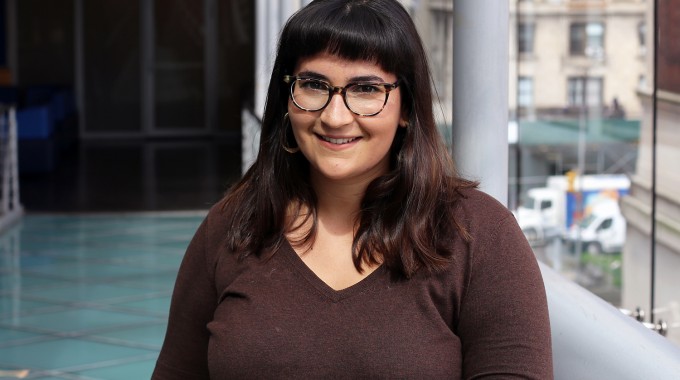If you know of a Columbia College student, faculty member, alumnus/alumna or program we should spotlight, or if you would like to submit a story, please contact:
Columbia College
Office of Communications
cc-comms@columbia.edu

“I was kind of an ‘everything’ person but more of a humanities person. [At Columbia] I knew I would have literature, philosophy, art and music alongside whatever major I chose, whether it was physics or political science.” —Olivia Ghosh CC’19
When Olivia Ghosh CC’19 was in high school in San Diego, CA, she knew she was strong in math and sciences but enjoyed other subjects, too. She was president of the school’s History Day club and won the English department award upon her graduation.
“I was kind of an ‘everything’ person but more of a humanities person. I knew I would have literature, philosophy, art and music alongside whatever major I chose, whether it was physics or political science…,” she said.
Ghosh challenged herself with honors math her first year, describing it as “the math class for people who think they might want to major in math. I didn’t want to major in math but it was a theoretical proof-based class and I’d never done that before.”
The class proved to be one of her most difficult — she almost dropped it in the middle of the semester but talked to her teacher, Professor of Mathematics Michael Thaddeus, first. He encouraged Ghosh and said he would help her as much as she wanted. She took him up on his offer.
“I ended up going to office hours second semester. He actually had taught Music Humanities. He could talk about math and Mozart, poetry. He was that figure of ‘capital-E Everything,’ too.
“At the very end, on the last day of class, Prof. Thaddeus read this long poem for us written by James Clark Maxwell, who’s actually a seminal figure in Physics – [Maxwell] did everything in physics; he basically derived electromagnetism – so it was the culmination of this intense, very draining but valuable math class, my physics interest and also poetry that was really beautiful. I thought that was pretty cool,” Ghosh said.
Before her sophomore year, Ghosh interned in Geneva as a John Jay scholar. At the European Organization for Nuclear Research (CERN) she spent the summer “searching for the answers to questions bigger than any I had imagined before, questions about how the universe looked seconds after the Big Bang.” That summer, she decided to major in physics.
The next year, Ghosh went abroad as an Oxbridge Scholar through the Office of Global Programs (now known as the Center for Undergraduate Global Engagement). At St. Peters College at Oxford, she focused first on physics and played squash, with what she described as “a little bit of philosophy on the side, back to liking everything.” The director of visiting scholars turned out to be a theologian and philosopher who had extensively studied French feminist and social theorist Simone de Beauvoir. So Ghosh added the deBeauvoir’s work, as well as philosophy of art and aesthetics, to her extracurricular courses. “It was really spontaneous and one-on-one, part of my core desire to do more than just one specialized thing.”
Back in New York, Ghosh returned to her specialization, physics. She spent most of her time in the lab researching condensed matter and strongly interacting systems, conducting her own tabletop experiments, a departure from her internship at CERN, where the experiments — in the world’s largest and most powerful particle accelerator — are underground and involve 3,000 collaborators.
“It’s a very elegant field. You can write down equations that really capture nature and can predict what’s happening — what’s going on in the world, what the world is made of and how it works,” said Ghosh. “It’s very powerful.”
After graduation, Ghosh plans to pursue her Ph.D. in physics after deferring one year to explore Europe and hike Mt. Everest and Nepal, very different treks than those she made the summer before her first year, from California to New York and then from Harlem to Brooklyn, where she interned at the office of U.S Rep. Hakeem Jeffries (D-NY).
“I think having more scientists in political life would only be a good thing because we’re trained to be problem solvers and respect evidence and fact-based things,” said Ghosh. “But my focus now is academia with the knowledge that I can always leave academia for something else after.”
As in, she can always continue to pursue a little bit of everything.